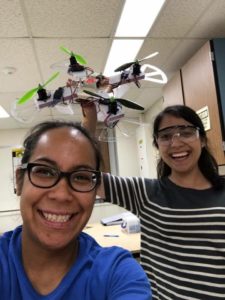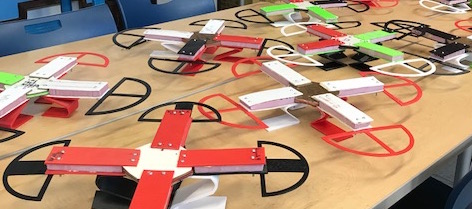By Eva Porter
After 17 years of teaching, I was asked by my principal at Cristo Rey Philadelphia to teach a project-based engineering class to our 12th graders. And not only was I going to teach engineering, I was going to teach them how to build drones.
Many things made me nervous and excited about this. Notably, the fact that I never took an engineering class nor built a drone. So, as one could imagine, I, as a traditional biology teacher, have experienced growth and an evolution to the way I teach. I realized these Star Wars quotes sum up what I’ve learned.
“I am no Jedi”
My first week was pure chaos and I felt like a brand new teacher who had never worked with or even seen teenagers before. It seemed like a cross between a circus and a game of whack-a-mole. There were so many things going on at once, there were various machines running, and it seemed like every 5 seconds another kid would have a hand raised asking me to fix something. After an exhausting first week, I had to accept the fact that I am no Jedi, I am no expert. I couldn’t possibly fix every kid’s problem while maintaining order in the classroom.
I had to come to grips with the idea that in order to gain control, I had to lose control. And that’s exactly what I did. I was honest with them. I told them that I’m not an engineer and that this is a totally new experience for me. I told them as they were trying to figure things out, I was also trying to do the same. Talk about a humbling experience.
I reassured them however, that my main job was to act as their guide and support them, make sure no one got hurt and to teach them the skills they would need to make and design things. The rest was up to them. I allowed the students to be messy, make mistakes, and work through their problems themselves. And as I allowed them to do that, I had to allow myself to have that same space as well. From this, I learned a lot from my students. I am no Jedi. And because of this, I realized that in order to be an effective teacher, sometimes you have to be humble and open to learning from the ones you teach.
My hope is that they learn life-long behaviors and applications that will allow them to be successful adults.” — Eva Porter, teacher
“When I left you, I was the learner, but now I am the master”

Eva Porter (foreground) and fellow teacher Lauren Misfud designed and built their own drone over the summer.
I haven’t found any greater joy as a teacher than watching these students sharpen their skills, become independent and help each other. Through the mess and the chaos, they are finding their rhythms and learning to navigate the class by themselves. They know where things are, they are getting better at finding creative solutions, and most importantly, they have found the strengths in each other. Not only does it make it easier for me and more manageable than a game of human whack-a-mole, but it also demonstrates to me that they are actually learning. They are becoming masters.
I’ve gotten such positive feedback from my students about how they enjoy helping others. It’s funny that the teenage brain processes the experience as just helping a friend, whereas I look at it as mastery of a skill. This has proven to me that it is imperative to incorporate peer collaboration as much as possible to develop and demonstrate mastery.
“The force will be with you always”
This particular course has forced me to reflect on my practice much more than I’m used to. One of the things that I reflect on the most is the take-aways from each class. When I taught biology, it was pretty simple. I’d ask myself things like, did my students learn new vocabulary? Could they describe the stages of mitosis?
With engineering, it’s been different. I know that some of my students won’t become engineers or build drones for a living, it would be silly of me to think that they all would. But I still want them to learn valuable lessons and transferable skills that would make them successful college students and adults. Unlike in the biology classes I’ve taught, I place a strong emphasis on the real-world relevance of each step of drone-building. For example, if they’re manufacturing a part, I emphasize the importance of precision and accuracy and relate repairing something in their home. I emphasize proper planning and being conservative with materials and cost. These are the major take-aways. The force will be with you always. They might not all become engineers, but my hope is that they learn more than just engineering. My hope is that they learn life-long behaviors and applications that will allow them to be successful adults.
Building drones with a group of teenagers has definitely been quite an adventure. I’m excited to see where this adventure takes us. I consider myself fortunate to have had the opportunity to work with students in this capacity. It has definitely reinvigorated my everyday life as a teacher because every day I walk into my classroom with a new hope.
Watch this video to learn more about the program in Eva Porter’s class:
Eva Porter is a biology teacher at Cristo Rey Philadelphia, bravely piloting Base 11’s Autonomous Systems Engineering Academy program with her high school class this year. Click here to learn more about the pilot program.

